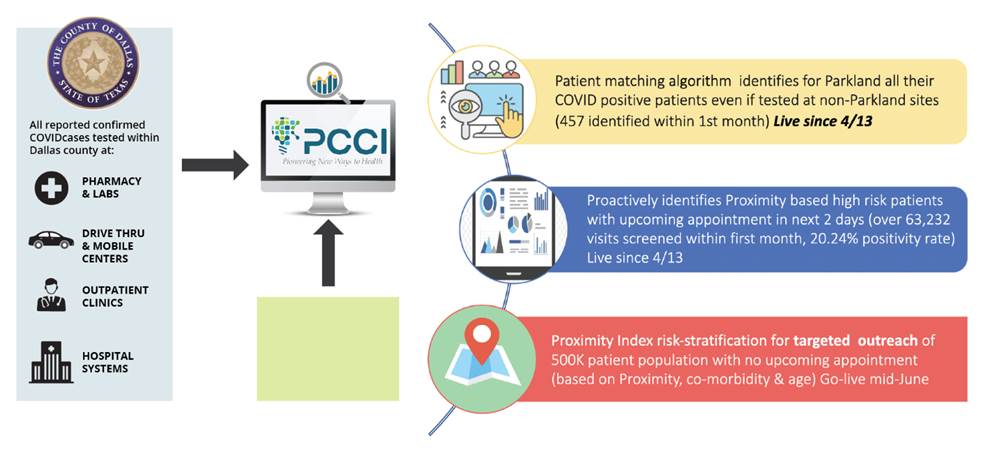
Manjula Julka, MD, MBA
Vice President, Clinical Innovation
Albert Karam, MS, Director, Data Gov. & Analytics
What You Should Know:
– How Parkland Center for Clinical Innovation developed a machine learning-driven predictive model called the COVID-19 Proximity Index for Parkland Hospital in Dallas.
– This program helps frontline workers to quickly identify which identify patients at the highest risk of exposure to COVID-19 by using geospatial analytics.
– In addition, the program helps triage patients while improving the health and safety of hospital workers as well as the friends and families of those exposed to COVID-19.
Since the earliest days of the COVID-19 pandemic, one of the biggest challenges for health systems has been to gain an understanding of the community spread of this virus and to determine how likely is it that a person walking through the doors of a facility is at a higher risk of being COVID-19 positive.
Without adequate access to testing data, health systems early-on were often forced to rely on individuals to answer questions such as whether they had traveled to certain high-risk regions. Even that unreliable method of assessing risk started becoming meaningless as local community spread took hold.
Parkland Health & Hospital System (the safety-net health system for Dallas County, TX) and PCCI (a Dallas, TX-based non-profit with expertise in the practical applications of advanced data science and social determinants of health) had a better idea. Community spread of an infectious disease is made possible through physical proximity and density of active carriers and non-infected individuals. Thus, to understand the risk of an individual contracting the disease (exposure risk), it was necessary to assess their proximity to confirmed COVID-19 cases based on their address and population density of those locations. If an “exposure risk” index could be created, then Parkland could use it to minimize exposure for their patients and health workers and provide targeted educational outreach in highly vulnerable zip codes.
PCCI’s data science and the clinical team worked diligently in collaboration with the Parkland Informatics team to develop an innovative machine learning-driven predictive model called Proximity Index. Proximity Index predicts for an individual’s COVID-19 exposure risk, based on their proximity to test positive cases and the population density. This model was put into action at Parkland through PCCI’s cloud-based advanced analytics and machine learning platform called Isthmus. PCCI’s machine learning engineering team generated geospatial analysis for the model and, with support from the Parkland IT team, integrated it with their Electronic Health Record system.
Since April 22, Parkland’s population health team has utilized the Proximity Index for four key system-wide initiatives to triage more than 100,000 patient encounters and to assess needs, proactively:
1. Patients most at risk, with appointments in 1-2 days, were screened ahead of their visit to prevent spread within the hospital
2. Patients identified as vulnerable were offered additional medical (i.e. virtual visit, medication refill assistance) and social support
3. Communities, by zip-code, most at-risk were sent targeted messaging and focused outreach on COVID-19 prevention, staying safe, monitoring for symptoms, and resources for where to get tested and medical help.
4. High exposure risk patients who had an appointment at one of Parkland’s community clinics in the next couple of days were offered a telehealth appointment instead of a physical appointment if that was appropriate based on the type of appointment

In the future, PCCI is planning on offering Proximity Index to other organizations in the community – schools, employers, etc., as well as to individuals to provide them with a data-driven tool to help in decision making around reopening the economy and society in a safe, thoughtful manner.
Many teams across the Parkland family collaborated on this project, including the IT team led by Brett Moran, MD, Senior Vice President, Associate Chief Medical Officer, and Chief Medical Information Officer at Parkland Health and Hospital System.
About the Manjula Julka and Albert Karam
Manjula Julka, MD, FAAFP, MBA, is the Vice President of Clinical Innovation at PCCI. She brings more than 15 years of experience in healthcare delivery transformation, leading a strong and consistent track record of enabling meaningful outcomes.
Albert Karam is a data scientist at PCCI with experience building predictive models in healthcare. While working at PCCI, Albert has researched, identified, managed, modeled, and deployed predictive models for Parkland Hospital and the Parkland Community Health Plan. He is diverse in understanding modeling workflows and the implementation of real-time models.
